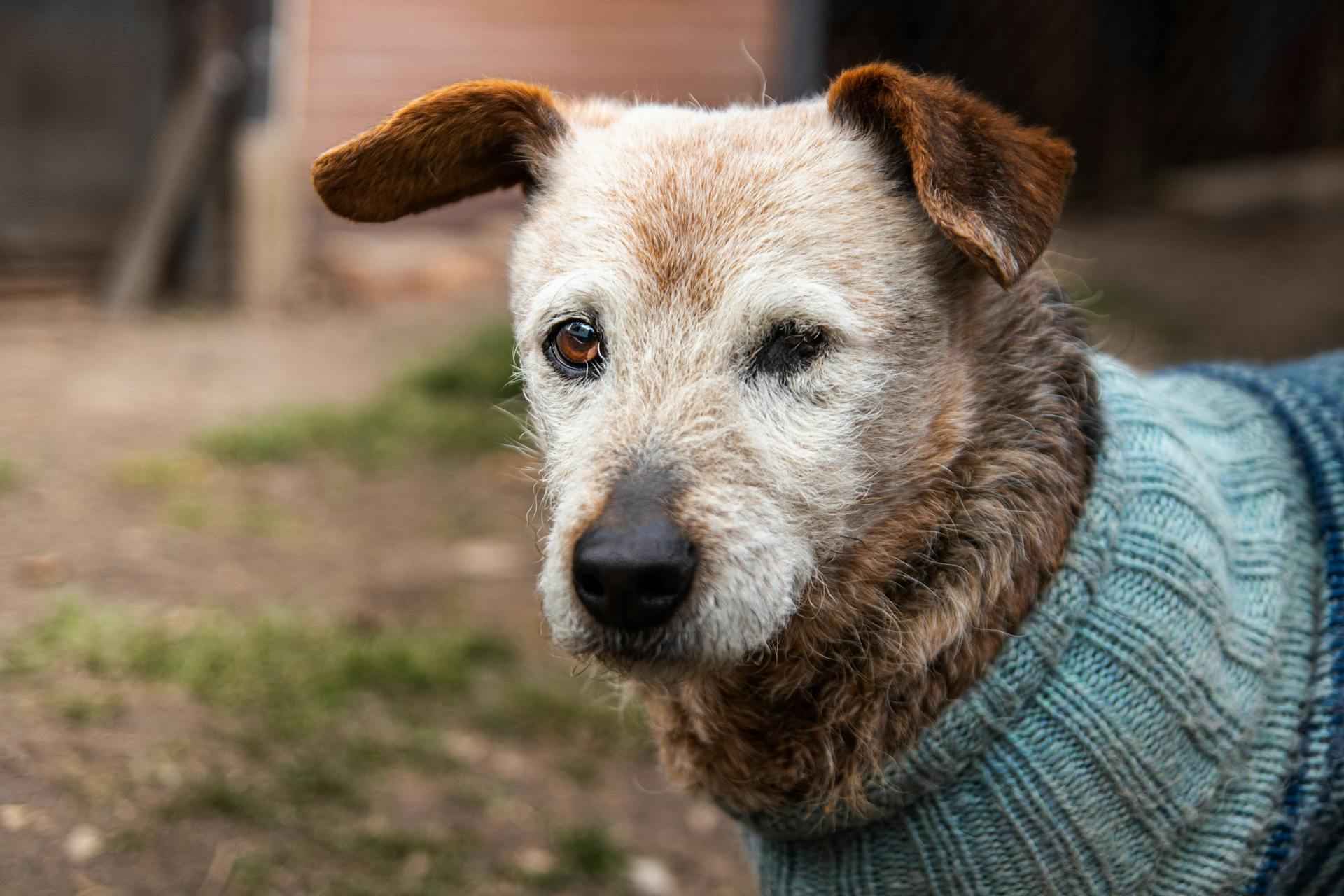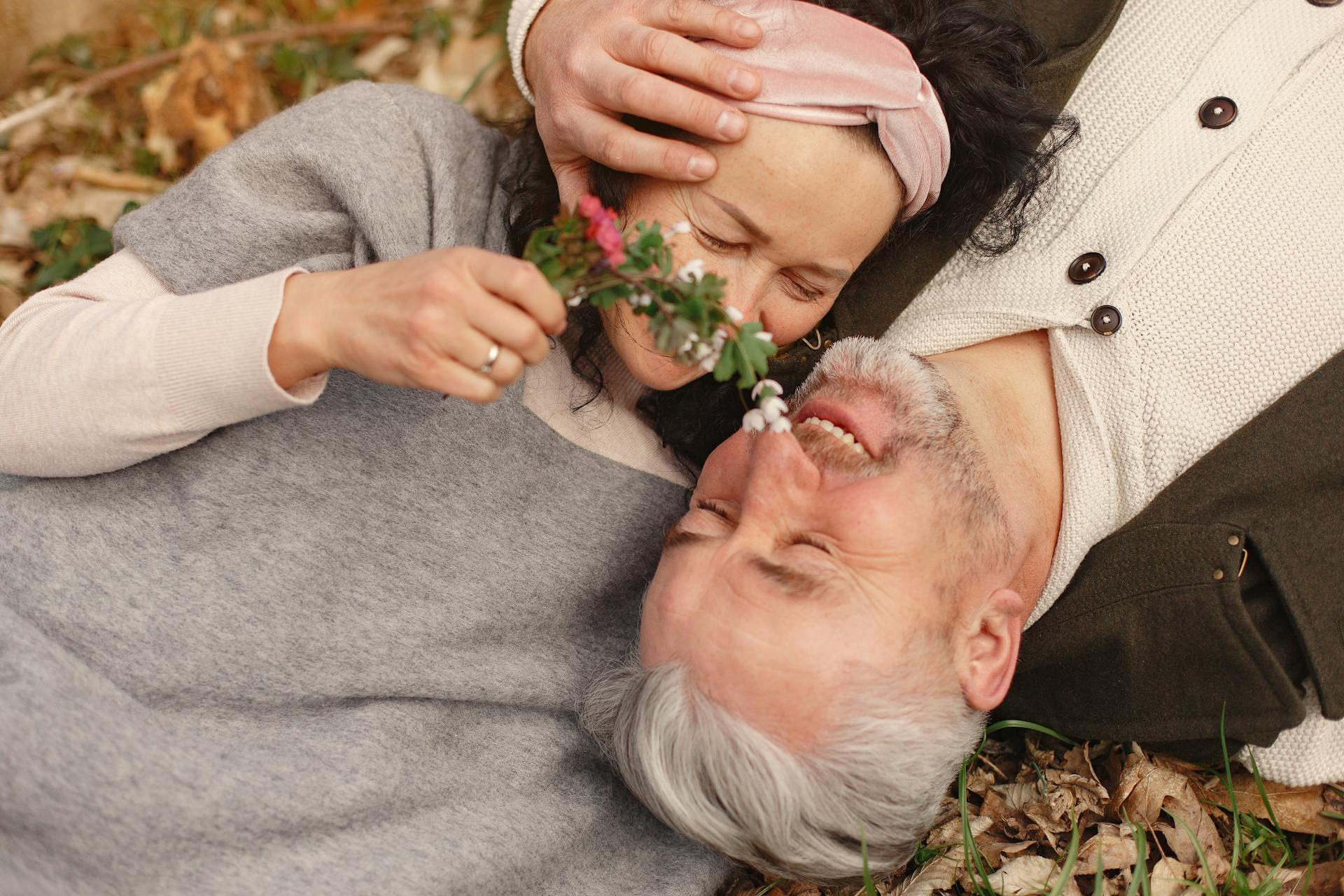
Shih Tzus are known to live up to 10 to 16 years on average, but unfortunately, they can start showing signs of aging as early as 7 years old.
As they enter their golden years, Shih Tzus may experience health issues such as eye problems, which can lead to vision loss and even blindness.
Their small size can make them prone to obesity, which increases the risk of joint problems, diabetes, and heart disease.
Regular exercise and a balanced diet can help prevent or manage these issues, but it's essential to monitor their health closely as they age.
Shih Tzu Health Issues
Shih Tzus are prone to several health issues that can affect their quality of life and longevity. Many of these issues are not fatal, but they can still cause significant problems.
Canine hip dysplasia is a common problem in Shih Tzus, where the hip socket doesn't develop correctly, leading to arthritis and increased pain. This can be a real challenge for little dogs.
Hypothyroidism is another issue that affects Shih Tzus, where the thyroid doesn't produce enough hormones, impacting organ functions and metabolism. This can be a serious issue if left untreated.
Eye diseases are also common in Shih Tzus, including dry eye, which can cause blindness or ulcers. Ulcers can be particularly problematic for small dogs.
Cataracts are another common eye issue in Shih Tzus, which can lead to vision loss as the condition progresses. This can be a serious concern for dog owners.
Kidney and liver disease can also affect Shih Tzus, and unfortunately, many dogs that develop this disease will pass away from it.
Senior Care and Lifespan
The senior stage of a Shih Tzu's life can be a challenging time, but with the right care, your furry friend can thrive. A senior Shih Tzu goes through many changes and will need special care.
It's essential to start with a trip to the vet to rule out serious problems. At home, you can do much to improve your dog's golden years by being attentive and offering extra support to overcome the challenges that come with age.
Shih Tzus are known for their long lifespan, with an average of 10-18 years. This means that while some Shih Tzus will only live to the average of 11.9 years, many will live much longer.
On a similar theme: American Bully Care
Senior Care
As your Shih Tzu enters its golden years, it's essential to provide special care to ensure its comfort and well-being.
A trip to the vet is a must to rule out serious problems that can arise with age.
Being attentive and offering extra support can make a big difference in your dog's life.
You can start by checking their dental health, as Shih Tzus get their adult teeth at about 6 months.
Beyond this, you'll need to make a judgment based on your dog's health, mobility, and looks.
For smaller breeds like the Shih Tzu, senior age typically occurs at 10 years, although some owners say it starts at 7.
A veterinarian will generally look at dental health and other factors to give a clearer picture of your dog's age.
As your Shih Tzu ages, you may notice it slowing down and needing more rest.
This is a normal part of the aging process, and with the right care, your dog can still live a happy and healthy life.
You might enjoy: Lakeland Terrier Life Expectancy
Lifespan Comparison in Dogs
The lifespan of dogs can vary significantly depending on the breed. Shih tzu dogs, for example, live longer than most dog breeds.
According to the U.K.'s Royal Society for the Prevention of Cruelty to Animals (RSPCA), the average lifespan of a purebred dog is 11.9 years.
Factors Affecting Lifespan
Genetics play a significant role in determining a Shih Tzu's lifespan, with some breeds being prone to certain health issues.
Hip dysplasia, a common problem in Shih Tzus, can lead to arthritis and increased pain, affecting their quality of life.
Early identification and treatment of these conditions, such as hypothyroidism and eye diseases like dry eye and cataracts, can increase the likelihood of successful treatment.
Genetic screening of a breeder's puppies can help identify potential health issues, allowing owners to make informed decisions.
Unfortunately, some Shih Tzus are prone to kidney and liver disease, which can be life-threatening if left untreated.
For another approach, see: Life Expectancy of Giant Schnauzer
Why Is the Tzu Lifespan Long
The Shih Tzu's long lifespan is likely due to its small size, a trait that's common among small dog breeds. Small dogs typically live longer than large dogs, with a study in the American Naturalist finding that large dogs can age nearly twice as fast as small dogs.
One of the most notable examples of a small dog breed with a long lifespan is the Shih Tzu, which can live up to 18 years. This is even higher than the average lifespan of small breed dogs, which is 12-15 years according to the American Kennel Club (AKC).
Smaller animals, including dogs, tend to live longer than their larger counterparts. This is evident in the animal kingdom, where whales and elephants live longer than smaller animals, but the smallest individuals within a species live the longest.
The Shih Tzu's long history may also contribute to its longevity, making it one of the few small breed dogs with an average life expectancy longer than 15 years.
Explore further: Seresto Small Dog Flea Collar
Environment and Conditions
Having a safe and healthy environment is crucial for your dog's well-being and longevity. A dog that has plenty of space to move around will naturally live a longer life.
You can't always choose where you live, but you can ensure the internal and external property conditions are as safe as possible. Keep medicines, cleaning products, and other toxins in closed cupboards out of the way.
Some plants in the garden might cause harm to your dog, so it's essential to check the garden regularly. Freeing your dog from potential hazards will give them a better chance at a long and happy life.
Genes
Genes play a significant role in determining a dog's lifespan. Genetics can cause breathing difficulties that may shorten a dog's life.
Some breeds, such as Shih Tzus, are prone to genetic conditions that can affect their lifespan. Both of these conditions can cause breathing difficulties.
Early identification and treatment of genetic conditions can increase the likelihood of successful treatment. If you suspect your Shih Tzu has a genetic condition, seek veterinary assistance right away.
If this caught your attention, see: Pug Dog Breathing Problems
Why Do People Live Longer
People live longer due to advancements in healthcare, which has led to a significant decrease in mortality rates from infectious diseases.
Improved access to clean water and sanitation has also played a crucial role in increasing lifespan.
According to the article, countries with higher GDP per capita tend to have longer lifespans, with an average increase of 2-3 years for every $1,000 increase in GDP.
This is likely due to better access to healthcare and education.
A healthy diet and regular exercise can also contribute to a longer lifespan, with studies showing that people who eat a Mediterranean-style diet tend to live up to 10 years longer than those who don't.
The article highlights the importance of a balanced diet in maintaining overall health.
Genetics also play a role in determining lifespan, with some people being born with a genetic predisposition to live longer.
This is due to the presence of certain genes that help to protect against age-related diseases.
Overall, a combination of factors contributes to a longer lifespan, and making healthy lifestyle choices can have a significant impact on one's health and wellbeing.
A different take: Shih Tzu Food List
Common Health Issues
Shih Tzus are prone to various health issues that can affect their quality of life and longevity. Many of these conditions are not fatal, but they can make a dog less active and reduce their lifespan over time.
Canine hip dysplasia is a common problem in Shih Tzus, where the hip socket doesn't develop correctly, leading to arthritis and increased pain. Hip dysplasia can also cause your Shih Tzu to become less active.
Shih Tzus are also at risk of hypothyroidism, a condition where the thyroid doesn't produce enough hormones, affecting organ functions and metabolism. This can be a serious issue if left untreated.
Eye problems are another common issue in Shih Tzus, including cataracts, dry eye, and progressive retinal atrophy (PRA). These conditions can reduce your dog's vision and lead to decreased mobility.
Kidney and liver disease are also potential health issues in Shih Tzus, which can be fatal if not treated promptly.
Worth a look: Do Dogs Drink Less Water in Winter
Common Health Issues Affecting Life Expectancy
Shih Tzus are prone to several health issues that can affect their life expectancy. Canine hip dysplasia is a common problem that occurs when a dog's hip socket isn't developing correctly.
Hip dysplasia can lead to arthritis and increased pain in your Shih Tzu. This can make it difficult for them to move around and get the exercise they need.
Hypothyroidism is another common health issue in Shih Tzus. It occurs when the thyroid gland doesn't produce enough hormones, affecting the dog's organ functions and metabolism.
Shih Tzus are also at risk for eye diseases, including dry eye and cataracts. These conditions can cause blindness or ulcers, making it difficult for your dog to see properly.
Kidney and liver disease are also potential health issues in Shih Tzus. Unfortunately, many dogs that develop these diseases will pass away from them.
Both hip dysplasia and patellar luxation can decrease a dog's mobility, leading to a more sedentary and shorter life. Patellar luxation occurs when a dog's kneecap shifts out of the socket.
The unique eye shape of Shih Tzus can lead to eye problems, including cataracts, dry eye, and progressive retinal atrophy (PRA). These conditions can reduce your dog's vision and lead to decreased mobility.
Readers also liked: How Often Do Goldendoodles Go into Heat
Breathing Problems
Shih tzus are at risk of developing breathing problems due to their brachycephalic breed characteristics, which include short snouts and shortened airways.
This condition, known as Brachycephalic Obstructive Airway Syndrome (BOAS), makes it difficult for the dog to regulate its body temperature.
The combination of BOAS and the shih tzu's long coat puts them at an increased risk of heat stroke.
In severe cases, BOAS can lead to additional long-term health issues.
Trachea collapse is another emergency medical condition that can be fatal without immediate treatment, and shih tzus are at risk of developing this condition as well.
This condition causes a distinct honking noise and makes it difficult for the dog to breathe.
Skin Irregularities
As your Shih Tzu ages, lumps and bumps will likely develop. Most are harmless and can be easily managed with a vet's check-up.
Some lumps and bumps may be painful to touch or cause bleeding if they rub against the harness or collar. Contact with these areas can lead to scabbing.
Running a clipper over lumps and bumps can be painful for your senior dog, and even cause infection if not handled carefully. Groomers need to take extra care when trimming around these areas.
If a wart interferes with your Shih Tzu's hairstyle, it may need to be removed.
Here's an interesting read: Schnauzer Skin Bumps
Frequently Asked Questions
When should I put my Shih Tzu down?
Euthanasia may be considered if your Shih Tzu's condition is severe, irreversible, or causing significant suffering. Consult with your veterinarian to determine the best course of action for your dog's specific situation
Sources
- https://yourdogadvisor.com/senior-shih-tzu-care/
- https://www.ncbi.nlm.nih.gov/pmc/articles/PMC10807147/
- https://nativepet.com/blogs/health/shih-tzu-life-span
- https://www.dogster.com/dog-health-care/shih-tzus-lifespan-how-long-do-they-live
- https://www.petsmont.com/blogs/pets/how-many-wonderful-years-will-your-beautiful-shih-tzu-live
Featured Images: pexels.com


